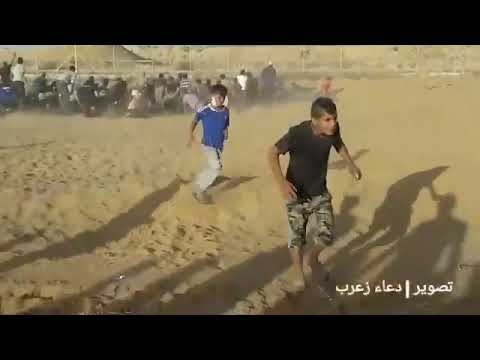The word choice by Guardian editors in a headline accompanying a March 29th article – by their Jerusalem correspondent Oliver Holmes – of this weekend’s Gaza border riots is telling:
 You typically “brace” for some dangerous incident likely to occur that you’re unable to control, like a hurricane. But, this is more than just a quibble over one word, as the headline accurately reflects the Guardian’s malfeasance in covering the year of weekly riots as if they’re acts of nature, rather than the result of decisions made by Hamas leaders.
You typically “brace” for some dangerous incident likely to occur that you’re unable to control, like a hurricane. But, this is more than just a quibble over one word, as the headline accurately reflects the Guardian’s malfeasance in covering the year of weekly riots as if they’re acts of nature, rather than the result of decisions made by Hamas leaders.
Recall that on March 15th, that weekend’s planned demonstrations were cancelled in order restore calm in the aftermath of 12-hours of violence that included two rockets launched at Tel Aviv, demonstrating would what be obvious to any neutral observer: that Hamas exercises near total control of the strip and can turn the violence on and off at will. As we saw with their brutal crackdown on peaceful economic protests earlier in the month, if Palestinians act in a manner deemed contrary to the government’s interests, its security personnel will swiftly end it.
This is the relevant context by which to view the article’s strap line:
If Hamas leaders had prevented the year long violent demonstrations on the border of a country they’re at war with, then the body count would have consisted of zero killed and zero injured.
More evidence that the Guardian fails to take Palestinians seriously as agents of their own fate can be found in their assertion, in the same March 29 article, that “The Great March of Return demonstration was launched with aims to lift a blockade that has trapped the enclave’s 2 million residents and to push for recognition of the right of return for Palestinian refugees”.
This not only legitimises the absurd notion that two million Palestinians – 99% of whom aren’t actually refugees – should be allowed to emigrate to Israel, and obfuscates Hamas’s control of the demonstrations. It also fails to acknowledge the simple fact that the blockade, which includes an IDF naval blockade deemed ‘legal’ by the UN, was implemented to stop the flow of arms to Hamas – an internationally recognised terror group which has reigned thousands of rockets on Israeli communities and is (still) committed to the state’s destruction.
The article goes on to uncritically quote Doctors Without Borders (MSF) claiming that Gaza’s health system has been “ruined by more than a decade of Israeli blockades”. But, this is contradicted by the fact that the blockade only impacts military items and dual-use items (putatively civilian goods that can also be used for military purposes), and that there are almost no restrictions on medical supplies or humanitarian aid of any kind.
Another article by Holmes in the Guardian published on the same day cites ‘statistics’ on the year of what he surreally described as the Gaza “protest movement”, including one purporting to demonstrate Israeli cruelty in response to the thousands of Palestinians seriously injured during the riots. We refuted that claim in the following tweet, citing information we received from COGAT:
.@guardian CLAIM: "#Israel has prevented patients from entering its well-resourced hospitals"
FACT: In 2018, over 33,000 Palestinians in Gaza were granted medical permits for treatment in Israeli or WB hospitals – a 15% increase from 2017.
Source: @cogatonline pic.twitter.com/71E4hGPvu4
— CAMERA UK (formerly UK Media Watch and BBC Watch) (@CAMERAorgUK) March 31, 2019
The article also provides stats on the number of Palestinians under 18 who were injured or killed during the border riots, yet fails to explore the corollary: that Hamas allows or actively sends children into battle zones to serve as human shields.
However, the cruel and inhumane treatment of Palestinians by Palestinian leaders, and the misery they impose upon the population by virtue of their strict adherence to an extremist ideology which prioritises the hatred of Jews and Israel over all else, isn’t the tale the Guardian wants to tell. Telling such a story would require viewing Palestinians as not just victims, but as moral agents whose decisions impact their society’s economic and political outcomes, a causal explanation that those in thrall to the facile and reductive victimological explanations for complex problems are loath to tell.
Related Articles
- Nathan Thrall’s Propaganda Welcomed at the New York Times (CAMERA)
- Euphemism and inaccuracy in BBC News website Entebbe report (BBC Watch)
- Indy’s Robert Fisk crosses the line into antisemitism (UK Media Watch)
- The illiberal logic of intersectionality (Quillette)





